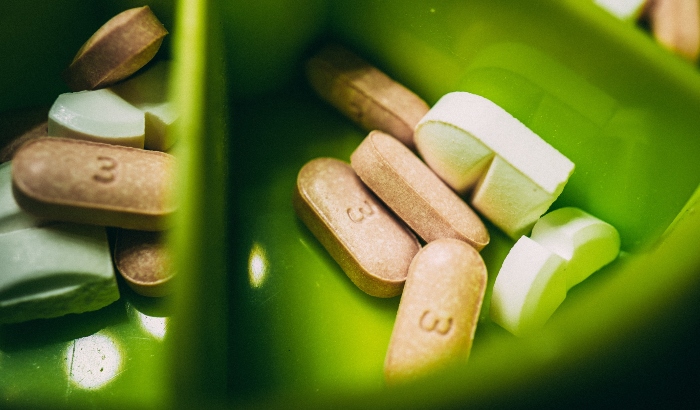Vegetarians, vegans, and non-vegetarians must make sure that their nutrient needs are met. In order for vegans and vegetarians to cover the most common nutritional shortfalls, it is important to follow a carefully planned diet. In this guide, we will explore some of the top vegetarian and vegan friendly supplements. Popular vegetarian and vegan friendly supplements, such as Omega-3s, are beneficial for overall health. These two fatty acids, docosahexaenoic acid (DHA) and eicosapentaenoic acid (EPA), can help to reduce the risk of diabetes and keep bones strong, as well as support a healthy heart and normal brain function. Fish are the primary source of EPA and DHA. Vegetarians and vegans can opt for fish-free omega-3 supplements that contain either DHA or a combination of DHA and EPA that is derived from microalgae. Alpha-linolenic acid (ALA) is an easy to find plant-based form of omega-3 that is contained in flaxseeds, walnuts, chia, soybean, tofu, and flax oil. If you are currently breastfeeding or pregnant, it is best to consult with a doctor before taking any supplements. It is essential to consult a doctor concerning DHA supplementation, which is vital for the central nervous system and the brain, and assists in the healthy growth of your infant.
Vitamin B12
Everyone needs Vitamin B12 for healthy nerves and blood and a lack of Vitamin B12 can cause exhaustion, anemia, or permanent nerve harm. B12 is made by the intestinal bacteria and large quantities are found only in animal products though dairy and eggs do offer some B12. You may choose to consume plant-based milks, breakfast cereals fortified with B12, nutritional yeast, or meat alternatives. Taking multivitamins or B12 supplements in non-animal gelatin capsules is also an option.
Iodine
The body requires iodine to make thyroid hormones for cell repair and metabolism. It can be found in certain foods. A lack of iodine can lead to hair loss, dry skin, fatigue, weight gain, a swollen neck, and difficulties with learning, a heavier or more irregular menstrual cycle, or a lower heart rate. Foods that are high in iodine include eggs, dairy, seaweed, lima beans, prunes, and salt that has been fortified with iodine.
Vitamin K
This essential nutrient helps stop excessive bleeding and helps blood to clot. Vitamin K is found in two different forms: vitamin K1 (found in some plant oils and vegetables) and vitamin K2 (present in animal products and fermented dishes). A deficiency in this vitamin can lead to a number of issues, such as blood clots beneath nails, dark and bloody stool, excessive bleeding, and easy bruising. Foods containing high levels of vitamin K are kale, spinach, collard greens, broccoli, vegan sauerkraut, kimchi, Brussels sprouts, and dairy-free kefir.
Iron
Iron is a vital nutrient essential for producing red blood cells that transport oxygen from the lungs to the rest of the body. Moreover, it helps with brain development and is used to make specific hormones. Iron is present in both plant-based and animal-based food sources, however, vegans should have almost twice the recommended dietary allowance compared to meat-eaters. It can be hard for the body to take in iron from plant-based foods (nonheme iron). Not having enough iron may result in tiredness, weak and fragile nails, lightheadedness, cold hands and feet, shortness of breath, chest soreness, or fatigue. Foods that contain iron include pumpkin seeds, dried fruit, spinach, broccoli, quinoa, beans, tofu, fortified cereal, nuts, and so on. Whole grain pasta is a healthy option that can help provide essential nutrients. Vitamin D, sometimes referred to as the sunshine vitamin, is important for absorbing calcium which helps promote bone health. A lack of Vitamin D has been linked to higher blood pressure, cancer, and depression. Some foods have Vitamin D added to them, such as orange juice, and vegan Vitamin D3 options sourced from lichen. Calcium is an essential mineral for bone health and can reduce the risk of fractures in older adults. In order to get your daily dose of calcium, you can turn to dairy products, collards, kale, cabbage, orange juices, tofu, fortified plant milks, and multivitamins.
Multivitamins
Multivitamins are a great way to supplement your diet with essential nutrients like Vitamin D, B12, and calcium. Nutrients like iron, zinc, and iodine can be hard to come by. Seeds, nuts, and iodized table salt are a good source of zinc and iodine, respectively, but phytates in legumes and whole grains can block the absorption of zinc, and the absorption of iodine can be hindered by cruciferous veggies, soybeans, and sweet potatoes. Similarly, iron can be difficult to obtain. Women who haven’t gone through menopause may need to supplement their iron levels due to the amount of blood loss during menstruation. Eating leafy greens and beans that are high in iron, together with foods that contain vitamin C, can help the body absorb the mineral. To get the most out of a multivitamin, look for one labeled “vegan” or “vegetarian” since these often include digestive enzymes and probiotics. Consuming probiotics can be beneficial in aiding digestion and allowing for optimal nutrient absorption from both dietary supplements and food.
Supplements 4 Muscle – Adopting a carefully planned plant-based diet can be an effective way to protect yourself from certain illnesses and diseases. If you are a vegetarian or vegan, it is important to be aware of your daily intake of vitamins, minerals, and other essential nutrients. https://supplements4muscle.com/en/35-health-and-vitality
Readers May Also Like:

What Are Some of The Biggest Affair Scandals in Hollywood?

How To Make Bot Followers On Instagram

E-Commerce Shopping Roundup: Shein vs Temu

8 Creative Ways To Style Your Human Hair Wig & Lace Front Wig For A Fab Look

